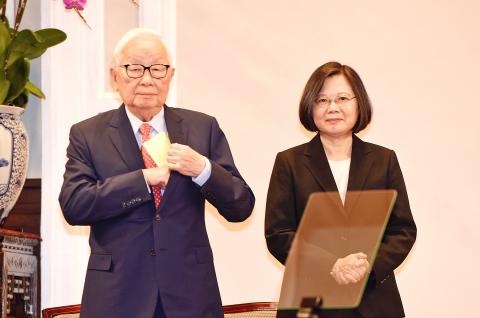Taiwan Semiconductor Manufacturing Co (TSMC, 台積電) founder Morris Chang (張忠謀) is to be the nation’s representative to next month’s APEC leaders’ summit in Papua New Guinea, President Tsai Ing-wen (蔡英文) announced yesterday.
Chang is the best choice to represent Taiwan at the summit, which is themed “Harnessing Inclusive Opportunities, Embracing the Digital Future,” Tsai told a news conference at the Presidential Office Building in Taipei.
Chang was widely expected to be chosen as the representative.

Photo: George Tsorng, Taipei Times
Despite its status as a full member of the 21-member APEC forum since 1991, Taiwan’s presidents are traditionally prohibited from attending the yearly summit due to China’s opposition.
Chang told the news conference that he plans to address how small economies can deal with the challenges of emerging economic nationalism.
Taiwan is an integral part of the global innovation supply chain and has a major role to play in shaping the future of the global digital economy, said Chang, who built TSMC into the world’s biggest contract semiconductor maker.
However, some nations are embracing protectionism by insisting that products be made within their borders and prioritizing their own national interests, which poses growing challenges to small economies such as Taiwan, he said.
Chang said he would also exchange views with world leaders on how to address these challenges.
Tsai said there were several reasons behind her decision, including Chang’s stature within the international business community and outstanding contributions to the development of Taiwan’s technology industry and digital economy.
Chang is also highly respected throughout Taiwan and is representative of all sectors of society, she added.
Tsai said she hopes the delegation would fulfill two missions: explore potential areas for cooperation and present to the world Taiwan’s strength in and vision for the digital economy.
The summit is to be held from Nov. 12 to 18, with the leaders’ meeting scheduled for the final day.
Taiwan’s delegation would also include Minister Without Portfolio John Deng (鄧振中), National Development Council Minister Chen Mei-ling (陳美伶), Minister of Economic Affairs Shen Jong-chin (沈榮津) and National Security Council Deputy Secretary-General Tsai Ming-yen (蔡明彥), the Presidential Office said.

Conflict with Taiwan could leave China with “massive economic disruption, catastrophic military losses, significant social unrest, and devastating sanctions,” a US think tank said in a report released on Monday. The German Marshall Fund released a report titled If China Attacks Taiwan: The Consequences for China of “Minor Conflict” and “Major War” Scenarios. The report details the “massive” economic, military, social and international costs to China in the event of a minor conflict or major war with Taiwan, estimating that the Chinese People’s Liberation Army (PLA) could sustain losses of more than half of its active-duty ground forces, including 100,000 troops. Understanding Chinese

The Ministry of Foreign Affairs (MOFA) yesterday said it is closely monitoring developments in Venezuela, and would continue to cooperate with democratic allies and work together for regional and global security, stability, and prosperity. The remarks came after the US on Saturday launched a series of airstrikes in Venezuela and kidnapped Venezuelan President Nicolas Maduro, who was later flown to New York along with his wife. The pair face US charges related to drug trafficking and alleged cooperation with gangs designated as terrorist organizations. Maduro has denied the allegations. The ministry said that it is closely monitoring the political and economic situation

UNRELENTING: China attempted cyberattacks on Taiwan’s critical infrastructure 2.63 million times per day last year, up from 1.23 million in 2023, the NSB said China’s cyberarmy has long engaged in cyberattacks against Taiwan’s critical infrastructure, employing diverse and evolving tactics, the National Security Bureau (NSB) said yesterday, adding that cyberattacks on critical energy infrastructure last year increased 10-fold compared with the previous year. The NSB yesterday released a report titled Analysis on China’s Cyber Threats to Taiwan’s Critical Infrastructure in 2025, outlining the number of cyberattacks, major tactics and hacker groups. Taiwan’s national intelligence community identified a large number of cybersecurity incidents last year, the bureau said in a statement. China’s cyberarmy last year launched an average of 2.63 million intrusion attempts per day targeting Taiwan’s critical

AGING: As of last month, people aged 65 or older accounted for 20.06 percent of the total population and the number of couples who got married fell by 18,685 from 2024 Taiwan has surpassed South Korea as the country least willing to have children, with an annual crude birthrate of 4.62 per 1,000 people, Ministry of the Interior data showed yesterday. The nation was previously ranked the second-lowest country in terms of total fertility rate, or the average number of children a woman has in her lifetime. However, South Korea’s fertility rate began to recover from 2023, with total fertility rate rising from 0.72 and estimated to reach 0.82 to 0.85 by last year, and the crude birthrate projected at 6.7 per 1,000 people. Japan’s crude birthrate was projected to fall below six,